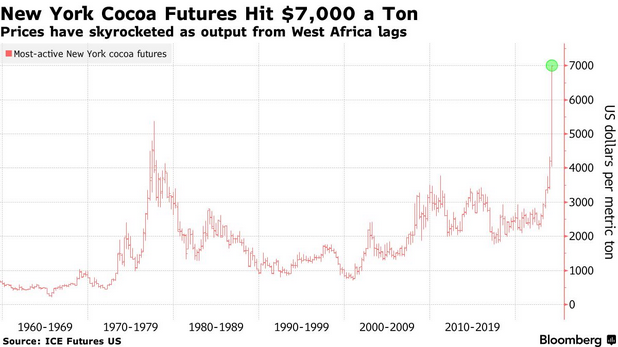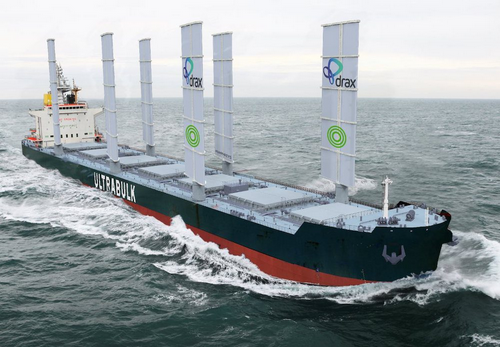March 13, 2024
Chocolate
Prices for chocolate shot up 70%.
- West African output lags
- Climate change is the cause: Poor weather, ill trees
Cocoa is produced in very few regions, in very poor conditions, and controlled by a small international cartel.
Given the importance of chocolate, it seems like something that should be invested in fixing. The planting of more cocoa trees is being slowed by (good) anti-deforestation laws, but there are other ways to expand production. It is difficult to see how such an industry can expand sustainably when it is so concentrated and under resourced.

Demand is actually down for chocolate, but it is not down enough to match the decline in production.
The International Cocoa Organization sees demand outpacing supply by 374,000 tons for the current October-September year, while Swiss chocolatier Barry Callebaut AG anticipates a 500,000 ton deficit this season
Holding rail companies to account
Propublica has a good story this week on lack of rail regulation in its continuing series peeking into the railroad industry.
The main focus is on missing health and safety data:
This tranche of missing injuries and deaths, however, exposes the clearest failure by regulators to hold companies accountable.
Much of the problem stems from the FRA’s porous reporting policies, which ProPublica found provide opportunities for companies to hide work-related injuries and deaths.
Canada reports rail worker deaths at a sombre average of three a year. But, these are similar regulation to the USA and the same companies.
Union petition on shipbuilding
In the USA, unions have petitioned the President to examine the shipbuilding industry and China. Beyond the regular anti-China rhetoric coming out of the USA recently, the shipbuilding industry is an important part of sustainable trade. Most ships are built in China, South Korea, and Japan.
It is a little odd to focus on this issue now and not, say, 30 years ago. But, when you think of the materials and technology that goes into marine shipping (similar to war vessel production), it does force the question "why don't we build these here?"
The answer is of course we have not invested in the infrastructure necessary to build ships cheaply. Which is a similar answer to most large-scale manufacturing in the Western economies. Capital has seen no reason to build things where labour, materials, and regulation drive up costs and profits down.
USW is driving the petition with an eye to jobs along what would be a heavily unionized supply chain.
I think that is a decent enough reason, but I think that there is another reason to invest in this.
The shipping industry's impact on climate change is not small. Reducing emissions is going to take some significant shifts in technology that power ships. Regulating such an industry where everything is made elsewhere and for the cheapest input costs is not exactly easy. Building public manufacturing capacity to build large ships is a decent way to do this. For the USA, the fact that they seem to be able to build aircraft carriers, but don't build large shipping container boats points to an imbalanced priority.
So, maybe we should make some peacetime boats? Maybe that have sails and is powered by the next generation of green ammonia engines?

Impact of Bill 7 in Ontario
Bill 7 promised to open up beds in hospitals by supposedly moving those who should be in long-term care and were occupying them to Long Term Care homes without their permission.
So, we should have seen a drop in wait times for access to long-term care for those moving from hospital and a change in the number of cases the hospitals were dealing with.
As you can see below, the changes in wait times and case load all happened before the passing of the bill in September 2022.
What does this mean? It means that the bill didn't really do anything except create an anti-patient system. This is not surprising, the way that we deal with folks moving from hospital into long-term care is to build more transitional rehabilitation spaces in communities, support for social services targeted at dealing with the real reasons folks are spending a long time in hospital, and more long-term care.
It also means that the pandemic created the conditions that everyone was freaking-out about in 2021/2022 where hospital beds were taken-up by those seeking long-term care. It is true that there was a sharp increase during these years, but that increase dealt with itself before the passing of Bill 7.
Bill 7 did nothing to impact any of the above. So, obviously, we see no positive effect of Bill 7 on the health system.


_chartbuilder.png)